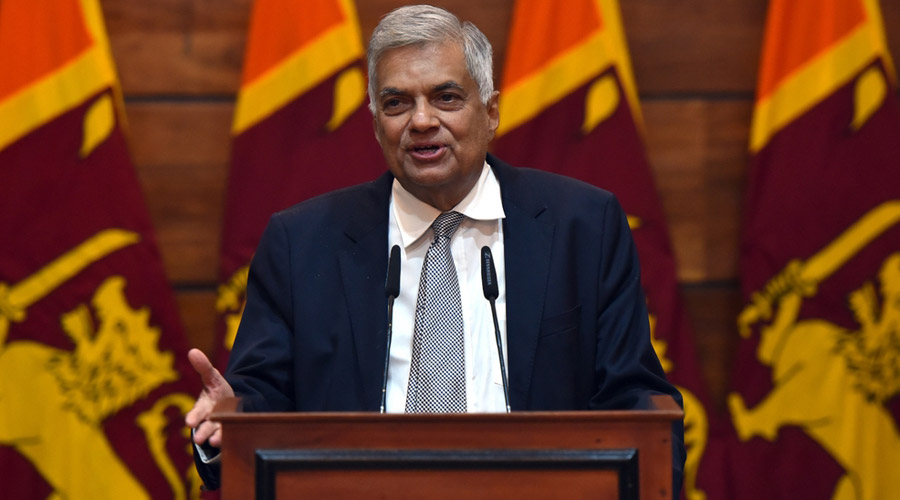Veteran politician Ranil Wickremesinghe was on Wednesday elected as Sri Lanka's President by lawmakers, in a rare move that could provide continuity for crucial discussions with the IMF for a bailout deal for the cash-strapped nation but a development that has angered anti-government protesters who renewed their demand for his resignation.
The 73-year-old Acting President and six-time former prime minister won a parliamentary ballot after his predecessor Gotabaya Rajapaksa fled the country amid escalating protests against his government over an unprecedented economic crisis marked by acute shortages of essentials like fuel, medicine and food.
Wickremesinghe secured 134 votes in the 225-member House while his nearest rival and dissident ruling party leader Dullas Alahapperuma got 82. Leftist Janatha Vimukthi Peramuna leader Anura Kumara Dissanayake secured just three votes during the voting held in Parliament amidst tight security.
Wickremesinghe's comfortable victory with the backing of the Rajapaksa's Sri Lanka Podujana Peramuna (SLPP) party also showed that the Rajapaksa family's firm grip on political power despite the resignations of President Gotabaya Rajapaksa, former prime minister Mahinda Rajapaksa and former finance minister Basil Rajapaksa in recent weeks in the face of massive anti-government protests.
In his victory speech soon after the results of the vote were announced by Speaker Mahinda Yapa Abeywardena, President Wickremesinghe, a key ally of former President Rajapaksa, thanked the two contenders, Dullas Alahapperuma and Anura Kumara Dissanayake, and urged the MPs to work together to revive the country's economy.
"The people are not asking us for old politics. I request Opposition leader Sajith Premadasa and other opposition parties including former Presidents Mahinda Rajapaksa and Maithripala Sirisena to work together, he said.
"We were divided for the last 48 hours. That period is now over. We have to work together now, he said, ahead of his planned swearing in ceremony on Thursday.
"Now that the election is over we have to end this division From now on I am ready to have a dialogue with you," he said.
Wickremesinghe also urged Sri Lankan Tamil leaders, some of whom who were opposed to his candidacy, to join him in rebuilding the nation.
The Indian High Commission here said it will continue to be supportive of the Sri Lankan people's quest for stability and economic recovery, through democratic means and values, established democratic institutions and constitutional framework.
"As a close friend and neighbour of Sri Lanka and a fellow democracy, we will continue to be supportive of the quest of the people of Sri Lanka for stability and economic recovery, through democratic means and values, established democratic institutions and constitutional framework, the Indian mission said in a tweet.
Wickremesinghe's victory could inflame the situation once again as many anti-government protesters see him as inextricably tied to the erstwhile Rajapaksa regime, blamed for the country's worst economic crisis since independence in 1948.
The protesters, who forced President Rajapaksa to flee the country and quit, on Wednesday demanded the resignation of his successor Wickremesinghe as well.
"He has been elected against the will of the people. The Rajapaksas have brought him in," Father Jeewantha Peiris, a spokesman for the protest group Aragalaya', told reporters.
"We will continue our protest campaign until Wickremesinghe resigns, he said.
Many protesters insist only a complete overhaul of government will satisfy their demands.
Protesters burnt down his private home and also stormed his prime ministerial office in Colombo in demonstrations against his leadership.
Wickremesinghe was sworn-in as acting president on July 13 after President Rajapaksa fled to the Maldives and then to Singapore from where he resigned in the face of public revolt against his government's mishandling of the country's economy.
In his address to Parliament, Wickremesinghe said the country was in a perilous state and the youth were clamouring for a change.
Wickremesinghe, who has been leading the crucial talks with the International Monetary Fund (IMF), last week said that negotiations were nearing conclusion.
Sri Lanka needs about USD 5 billion in the next six months to cover basic necessities for its 22 million people, who have been struggling with long queues, worsening shortages and power cuts.
Meanwhile, IMF Managing Director Kristalina Georgieva said it hopes to complete rescue talks with Sri Lanka "as quickly as possible."
Speaking with Nikkei Asia in Tokyo, Georgieva said the fund was very deeply concerned about the well-being of the people in Sri Lanka.
Wickremesinghe will have a mandate to serve out the rest of Rajapaksa's term, which ends in November 2024.
Wickremesinghe, who has been in Parliament for nearly five decades, was appointed as prime minister in May, nearly two years after his United National Party (UNP) was routed and failed to win a single seat in the general election held in 2020.
Widely accepted in political circles as a man who could manage the economy with far-sighted policies, Wickremesinghe is struggling to fix the economy which, he said, had collapsed at the time of his appointment in May.
Wickremesinghe, who is believed to be close to India and its leaders, has held many important posts during his career.
Today's election was the first time in 44 years that Sri Lanka's Parliament has directly picked a president. Presidential elections in 1982, 1988, 1994, 1999, 2005, 2010, 2015 and 2019 had elected them by popular vote.
The only previous occasion when the presidency became vacant mid-term was in 1993 when president Ranasinghe Premadasa was assassinated. DB Wijetunga was unanimously endorsed by Parliament to run the balance of Premadasa's term.











